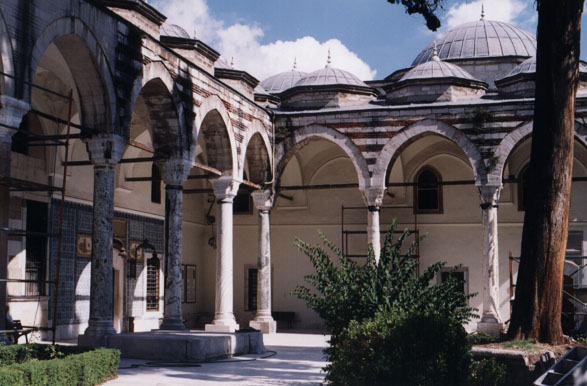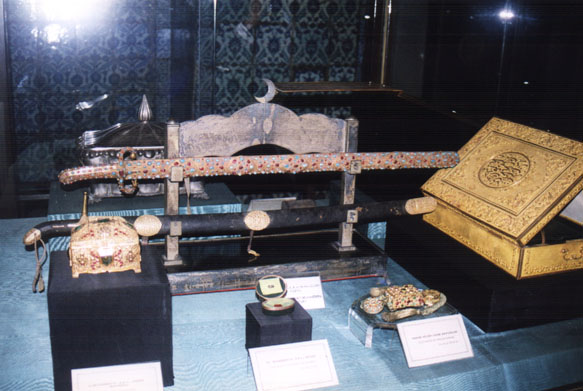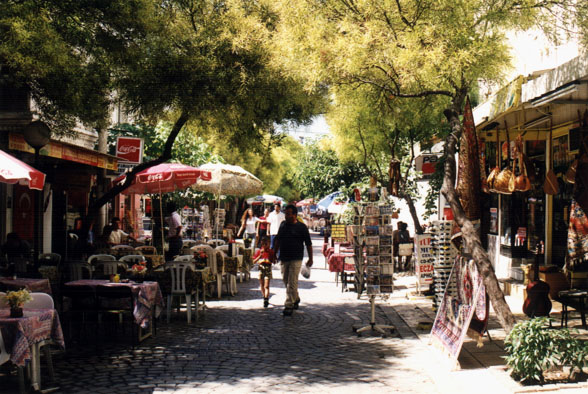The Topkapi Treasury was equally stunning, with its fine collection
of jewel-encrusted thrones, royal medals, and the famous Topkapi
dagger, made out of one of the largest carved emeralds in the world.
From Topkapi we returned to the square between Aya Sofya and the
Blue Mosque, relaxing at a garden cafe just below the giant church. I
briefly ran around the corner to a kontürlü telefon
kiosk, outdoor public pay phones where you could make a telephone
call and then pay an attendant. Susanne and I needed to get ahold of
Aydin in order to find out if he could get us a room at the Kalehan
hotel in Selçuk. I called Aydin's cellphone but was given a
recording in Turkish and English that said his phone was out of
calling range -- he was probably on the road with a tour group. The
attendant told me the call was free because I wasn't able to connect.
As I walked away from the kiosk I heard him say, "Sizin kitab,
effendim" -- "Your book, sir." I turned around and noticed I
had left our Lonely
Planet book on the counter. I can only imagine what trouble I
would have been in with Susanne if I had lost the book that
contained all of our notes and plans.
Back at the cafe I rejoined Susanne to finish my Turkish coffee and
talk about our plans for the next few days. The two of us were
getting hungry so we decided to pay our bill and find a full-service
restaurant for lunch. The waiter was sitting a few tables from us,
concentrating on his newspaper. I walked over and asked for the bill
and he quickly folded up the paper. As he did this I noticed it was
full of pictures of naked women. He gave me the bill as well as a
grimace of embarrassment.
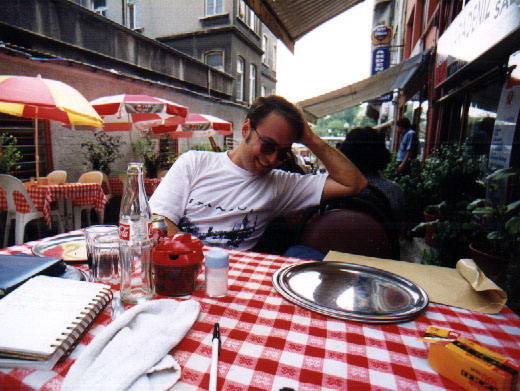 |
| Andy hanging out at the
Karadeniz Pideci |
Uphill just behind Divan Yolu and the Sultanahmet tramway tracks
we found the Karadeniz Aile Pide ve Kebap Salonu -- The Black
Sea Pizza and Kebap Salon. We sat outside under a
red awning as Susanne ate a vegetarian Turkish pizza and I ate a
spicy plate of köfte
Salon. We sat outside under a
red awning as Susanne ate a vegetarian Turkish pizza and I ate a
spicy plate of köfte  kebap. A neighborhood cat
reconnoitered around our table, scouting for scraps. He didn't seem to
care for pizza crusts but was more partial to my köfte meat.
Just around the corner from the Karadeniz was the Sinem Internet
Cafe, where we were able to use their clean bathrooms for free and
check email for 200,000 lira (50 cents), or the cost of two public
bathroom visits in any part of the city.
kebap. A neighborhood cat
reconnoitered around our table, scouting for scraps. He didn't seem to
care for pizza crusts but was more partial to my köfte meat.
Just around the corner from the Karadeniz was the Sinem Internet
Cafe, where we were able to use their clean bathrooms for free and
check email for 200,000 lira (50 cents), or the cost of two public
bathroom visits in any part of the city.
We still had a little time before having to go to the airport, so
Susanne and I strolled down to the Hippodrome. Now a relaxing
public garden, in its heyday the Hippodrome was the city's imperial
racetrack. Along with its famous horse races, the Hippodrome was
also the center of political intrigue and conspiracy. During the
summer of 1826, the Hippodrome witnessed the end of the Ottoman
Empire's legendary squadron of soldier-slaves, the Janissaries.
Founded in the mid-1300s by Sultan Murad I as his imperial cavalry
guard, the Janissaries (Yeni Çeri, or "new troops") were
young Christian men, largely from the Balkans, who were captured
and enslaved during Ottoman conquests. This enslavement, however,
was also an opportunity for personal prestige and privilege.
Janissaries were trained to serve as the empire's elite fighting force,
and each soldier-slave was able to rise to the highest levels of
military service based on personal merit.
|
Anatolian Trivia
The Jannisaries were immensely proud of the fact that they were the
best-fed troops in the Ottoman Empire. So much so, their ranks were
organized on culinary terms. As a whole, the Janissaries referred to
themselves as the ocak (the hearth or fireplace); their symbol was a
sacred cooking cauldron. Among the terms they used to represents
their individual ranks were çorbaci (the soupmaker),
asçibasi (the chief cook), gözlemici (the pancake
maker) and the çörekci (the cake maker). On the occasions when they began a rebellion against the sultan, they would signify their ire by turning over their giant cauldrons of rice pilaf. Even today, the Turkish expression "to overturn the cauldrons" means to rebel against someone.
|
During the 15th and 16th centuries, the Janissaries were the pride of
the Ottomans and the scourge of Christian Europe. In medieval cities
like Budapest and Belgrade, the "Turk bells" would ring to warn
citizens of their approach. At the height of the Ottoman Empire,
Suleyman the Magnificent's Janissaries penetrated deep into central
Europe, fighting their way to the gates of Vienna. But in the 17th and
18th centuries, the Janissaries began a long period of decline,
succumbing to the temptations of corruption and political
opportunism. On more than one occasion, Ottoman sultans were
deposed and even assasinated during coup d'etats staged by the
Janissaries. Numerous sultans were forced to placate the greety
Janissaries with ill-conceived military campaigns, many of which
furthered the decline of the empire.
By 1826, Sultan Mahmud II was fed up with the intransigence and
avarice of the Janissaries. Two decades earlier they had staged a
coup against his reform-minded brother, Sultan Selim III, partially
because he tried to impose European-style military uniforms on its
ranks. Selim was deposed and executed, and Mahmud would have
met the same fate if it hadn't been for a loyal slave who hid him
inside the unlit furnace of the royal baths. Proclaimed sultan in a
swift counter-coup later that same day, Mahmud longed to carry out
his murdered brother's dream of reforming the empire into a
modern imperial state - as well as to exact revenge on the
treacherous Janissaries.
Knowing the Janissaries would revolt if pushed hard enough,
Mahmud announced a series of radical military reforms. The
Janissaries, who were stationed in barracks inside the Hippodrome,
initiated their revolt by defiantly turning over their giant cooking
cauldrons and marching through the narrow streets of Sultanahmet
towards Topkapi Palace. There they were met with a barrage of
musket fire from soldiers loyal to the sultan. The Janissaries,
surprised by the resistance, retreated to the confines of the
Hippodrome, where they were unceremoniously slaughtered by
Mahmud's loyal cavalry and artillery squadrons. Over 4,000
Janissaries perished in the attack, ending the military order once and
for all, and opening the opportunity for Mahmud to reform his
empire into a modern, European-style nation.
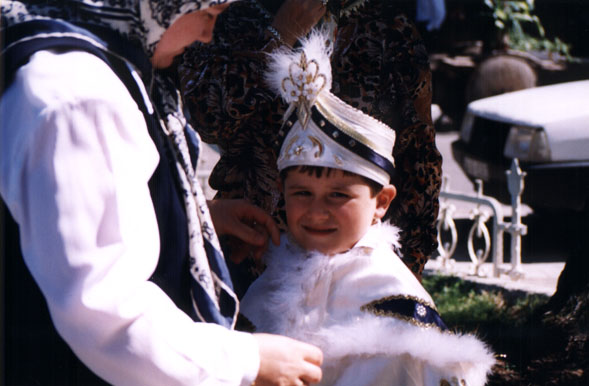 |
| Young boy in
circumcisional regalia |
Today, of course, there is no sign of the violence and intrigue that
once plagued this historic place. Scores of families were strolling
along the Hippodrome's garden, enjoying the early afternoon
sunshine. Streams of people washed their hands in Kaiser Wilhelm's
Fountain, a turn-of-the-century monument given to the sultan by the
kaiser during a visit to Constantinople. A young boy dressed in the
customary circumcision costume was herded into position by his
parents, who proudly snapped pictures of him. Susanne approached
family and asked if she could take a photo. The parents graciously
said yes, to the chagrin of the boy. Further down the mall we visited
the obelisk of Theodosius, an ancient Egyptian obelisk imported to
Constantinople by the emperor Theodosius in 390 AD. Theodosius
mounted the obelisk on a marble pedestal decorated with images of
his royal court and scenes promoting his battle prowess.
At the eastern end of the Hippodrome, not far from the Blue Mosque,
Susanne and I stopped at Cafe Mesale , a shady garden teahouse
sumptuously decorated with hanging carpets, Ottoman pillows and
blazing torches. Susanne ordered a tea while I ran around the corner
once again to call Aydin at the telephone kiosk. This time I managed
to get ahold of him; he told me we had reservations at the Kalehan
Hotel in Selçuk, and that the hotel recommended that we catch
a dolmus
, a shady garden teahouse
sumptuously decorated with hanging carpets, Ottoman pillows and
blazing torches. Susanne ordered a tea while I ran around the corner
once again to call Aydin at the telephone kiosk. This time I managed
to get ahold of him; he told me we had reservations at the Kalehan
Hotel in Selçuk, and that the hotel recommended that we catch
a dolmus to town from just outside the
Izmir airport. Aydin warned me it would be a bit of a walk from the
airport to the dolmus stop, but he said it probably wouldn't
take too long.
to town from just outside the
Izmir airport. Aydin warned me it would be a bit of a walk from the
airport to the dolmus stop, but he said it probably wouldn't
take too long.
|
Turkish Pronunciation
Interested in learning how to pronounce the Turkish words mentioned in this journal? Check out my Turkish pronunication guide!
|
As I returned to the cafe our waiter was talking to a pair of Turkish
women who were sitting to our left. They ordered some kind of cake,
so the waiter dashed around the corner and returned with a platter
topped with a silver lid. He placed the platter on the table and raised
the lid. To everyone's surprise a small black bunny jumped out into
one of the women's laps. She let out a brief scream and then laughed
hysterically, petting the frisky rodent. The waiter then came to our
table and asked if I wanted anything.
"Bir Türk kahve ve bir sisede memba su,
lütfen," I said, trying to ask for some Turkish coffee and a
bottle of water.
"You want coffee and what?" he said to me in English, confused.
"Uh, a bottle of water," I stumbled. "Sisede memba
su."
"Oh! Mem-BAH su," he laughed. "Not MEM-ba su -- mem-BAH su."
"Sisede mem-BAH su, then," I corrected myself,
accentuating the proper syllable this time around.
"Very good," he answered. "Now you can be a Turk."
We sat at Cafe Mesale for an hour, slowly sipping our drinks
and watching the black bunny hop around the table neighboring us.
Every few minutes we'd see a large seed pod of some kind come
crashing down from the tree above us, colliding with the cobblestone,
the tables, even a Spanish tourist's head. A little boy was going
around from table to table, picking the pods off the ground and
stuffing them in his mother's purse. One of them pounded me on the
shoulder and landed just off the table. I picked it up and found a
large nut encased in a thick shell.
"They are very good," our waiter commented as he saw me pick it
up.
"What kind of nut is it?" I asked.
"Kestane," he replied. "I don't know the name in English, but
they are eaten roasted. You can buy them roasted all over
Istanbul."
"They must be chestnuts, then," Susanne said. "Someone was selling
them near the Egyptian Bazaar yesterday."
I cracked the nut on the table and revealed the inner flesh of what
was indeed a chestnut. I ripped off a piece and tasted it --
unpleasantly sour.
"I told you," the waiter admonished me, seeing the grimace on my
face. "You should roast them first..."
Around 2:30pm we returned to the guesthouse to pick up our
backpacks and catch a taxi to the airport. The six-million-lira taxi
ride took less than 20 minutes, giving us plenty of time to check in
for our flight and hang out at the airport restaurant, drinking
lemonade and splitting a piece of pecan pie. Our flight was delayed
by 20 minutes but we eventually were allowed to board a transport
bus which would take us to the plane. The bus rode around the
tarmac for what seemed to be an eternity. We drove from terminal
to terminal, passing what appeared to be entire fleet of Türk
Hava Yollari (Turkish Airlines). Each plane was christened with
the name of a different Turkish city. In the 15 minutes we spent
circling the tarmac we managed a grand tour of the country:
Kusadasi, Ankara, Trabzon, Van, Edirne. Just as it seemed the only
place left for us to go was back to the terminal gate, the bus pulled
up next to Gaziantep -- a THY Boeing 767. Finally we were on our
way to Izmir.
The 45-minute flight passed by quickly as we scribbled in our
journals and noshed on an airline snack of packaged fruit cake. A six-
foot blonde woman who looked like Turkey's answer to Pamela Lee
sat to our right, reading some kind of engineering journal. On the
whole it was pretty uneventful, though I was eager to get to Izmir in
order to figure out how we would reach Selçuk. Izmir's airport
is south of the city center, along the road to Selçuk, but the
Izmir bus station was north of the city. If we were to take the bus,
we'd first have to go north through Izmir, Turkey's third largest
metropolis and currently the host of an enormous international trade
fair. Assuming we could get through the city to the otogar, we'd have
to catch a second bus to Selçuk, backtracking through Izmir,
past the airport again, before arriving at our destination. It wasn't a
scenario I relished, especially since there was a possibility that we
wouldn't arrive at the Izmir otogar in time for the last evening bus to
Selçuk. Hopefully we wouldn't have a problem figuring out
Aydin's suggestion to catch a dolmus instead.
instead.
Once inside the Izmir arrival terminal we looked around for a travel
information desk. Unfortunately the terminal hosted only a trade fair
bureau desk and a currency exchange. Just outside the terminal I
approached a policeman to find out if there was by any chance a
direct bus to Selçuk.
"Pardon, Memur Bey -- Selçuk otobus var
mi?"
-- Selçuk otobus var
mi?" I asked.
I asked.
"Yok," the policeman
replied.
the policeman
replied.
"Dolmus var mi?"
"Yok," he said again, clicking his tongue.
It looked like we were stuck finding that dolmus station
somewhere beyond the airport. Susanne and I walked away from the
airport, down a deserted road towards a police checkpoint. Several
paramilitary jendarma stood guard outside the checkpoint. They
could tell we looked a little lost. One of them called out to us in
Turkish, though I couldn't understand what he said.
"Iyi aksamlar, Memur Bey," I said to him as
we approached. "Ingilizce
konüsüyormüsünüz?"
Memur Bey," I said to him as
we approached. "Ingilizce
konüsüyormüsünüz?"
"Ingilizce?," he replied. "Yok.... No Ingleesh." As he spoke I noticed he
had the brightest blue eyes I had ever seen.
I struggled to find the right words in Turkish to explain that we were
looking for a dolmus to Selçuk. "Uh.... Bizim... gidiz...
Selçuk. Dolmus nerede?"
"Ah, dolmus," he replied. That was all I could understand as
he spoke to me rapidly in Turkish.
"Uh, yavas, lütfen,"
lütfen," I requested, asking him to slow
down. The policeman nodded his head and spoke slower, but I could
still not understand a word he said. He did, however, point down the
road in the other direction. Hoping that he was telling us to go the
other way, we thanked him and backtracked towards the airport.
I requested, asking him to slow
down. The policeman nodded his head and spoke slower, but I could
still not understand a word he said. He did, however, point down the
road in the other direction. Hoping that he was telling us to go the
other way, we thanked him and backtracked towards the airport.
"That soldier had the most beautiful eyes I've ever seen," Susanne
said.
"Yeah, even I noticed them," I replied.
We walked around the perimeter of the airport along the edge of a
highway. I didn't feel great about our predicament. An old man with
a walking stick approached us from the other direction.
"Pardon, effendim," I said. "Selçuk
dolmus nerede?"
I said. "Selçuk
dolmus nerede?"
"Orada," he replied, pointing
far down the highway.
he replied, pointing
far down the highway.
"Kaç saat?" I continued, wanting to know
how far of a walk we had ahead of us. "On dakika?
I continued, wanting to know
how far of a walk we had ahead of us. "On dakika? Otuz dakika?"
Otuz dakika?"
"Anlamadim," he responded. "Otuz dakika." I
don't know -- 30 minutes...
he responded. "Otuz dakika." I
don't know -- 30 minutes...
His answer didn't boost my confidence, so I suggested we return to
the airport and ask a few more people what options we had. I was a
little surprised that no one here spoke a word of English, considering
we were at a major international airport, but there wasn't much we
could do about it.
Entering the airport parking lot we reached a small sentry post. A
parking attendant sat inside, eating his dinner from a styrofoam box.
"Pardon, Memur Bey," I said yet again, "Selçuk dolmus
var mi?"
"Yok dolmus," he replied. "Bir dakika, lütfen..."
lütfen..." He then picked up the phone
and placed a call, speaking to someone for about 30 seconds before
hanging up. The sentry pointed to the terminal and said,
"Selçuk -- on besdakika." It appeared that there was a
bus or some other vehicle going to Selçuk at six o'clock, 15
minutes from then.
He then picked up the phone
and placed a call, speaking to someone for about 30 seconds before
hanging up. The sentry pointed to the terminal and said,
"Selçuk -- on besdakika." It appeared that there was a
bus or some other vehicle going to Selçuk at six o'clock, 15
minutes from then.
"Alti saat Selçuk, degil mi?" I asked, confirming the time.
"Var," he replied, nodding
his head once.
he replied, nodding
his head once.
Susanne and I walked quickly towards the terminal, up a walkway
from the parking lot. As we ascended the walkway I realized we had
entered a small train station. A train! It never occurred to me there
was a train station at the airport. I rushed to the counter and asked a
woman in Turkish if there was indeed a train to Selçuk.
"Yes," she replied in English. "Ten minutes on Platform One."
I was quite pleased with myself as we stood on the platform. "I'm so
glad I learned some Turkish," I said happily. "Without it there's no
way we could have figured this out. Finally some language practice
pays off."
A few minutes later we saw a train approach the platform. For some
reason it stopped just short of the platform. An attendant climbed off
the train and waved his hand to have us walk down the platform to
the train. Just before we reached the engine car I noticed two
German backpackers getting off the train. They were drenched in
sweat, with one of them cursing to himself loudly. It wasn't a
positive sign. We climbed down the end of the platform into the
grass and were helped onto the train by some passengers. As we got
on board we realized we were in for a rough ride: standing room
only, dozens of people packed like sardines in 100-degree heat.
We immediately took off our backpacks and placed them by our feet,
knowing there was no room on board for us to wear them. I managed
to reach over two people in order to get my left hand wrapped
around a metal pipe for support. Susanne, in turn, grasped my
shoulder to stay balanced. We were the only people on the train who
weren't Turkish. Old men in caps and baggy trousers wiped sweat
from their brow as their headscarved wives stood behind them. A
group of teenage boys maintained a polite distance from Susanne,
careful not to give offense in some way. Even though there were 40
or 50 people squeezed into the car it was unusually quiet, save the
rolling clatter of the tracks passing below us.
Susanne had an enormous smile on her face. "What the hell," she
said, shrugging. "This is going to be an adventure."
About five minutes into the ride I could feel a moist film of sweat
forming on my forehead. I used the sleeve of my free arm to wipe
my face. An old man with a scruffy five o'clock shadow smiled at me,
wiping his forehead in turn.
"Çok sicak, çok sicak," I said to him, commenting on
how hot it was. Several people glanced up when they heard me
speak Turkish.
I said to him, commenting on
how hot it was. Several people glanced up when they heard me
speak Turkish.
"Allah Allah, çok sicak," the man
answered, a large smile forming on his face. "Nerede gidisiniz?"
çok sicak," the man
answered, a large smile forming on his face. "Nerede gidisiniz?" he then asked, wanting to know
our destination.
he then asked, wanting to know
our destination.
"Selçuk," I replied, eager to find out how far away the town
was. "Selçuk Kaç saat?"
"Kirk kilometer," he answered. "Altmis dakika." We had 60 minutes
to cover about 40 kilometers, apparently.
As we stood there, swaying with the crowd as we braved the intense
heat, Susanne looked at me and pointed to her backpack.
"I have Wet Wipes, you know," she said quietly to me.
"I was just thinking that," I replied. "I don't know if we can use them
if we don't have enough to share, though."
"I know," she agreed. "I think we have enough." Susanne pulled out a
packet of moist towelettes, opening it up and handing me one. As I
unfolded it she offered another packet to the old man and his wife.
"Tesekkürler, yok," he said, bowing his head and touching his
chest with his hand, politely declining the offer.
"Lütfen, effendim," I insisted, showing him my unfolded Wet
Wipe.
"Tamam, tamam," he replied, accepting my offer.
"Tesekkür ederiz."
he replied, accepting my offer.
"Tesekkür ederiz." He removed two towelettes,
using one and passing the other to his wife.
He removed two towelettes,
using one and passing the other to his wife.
Susanne continued to pass the towelettes around the crowded car: to
a young mother and her child, to the group of teenage boys in soccer
shirts. One by one they dabbed the lemon-fresh towelette on their
foreheads, enjoying the brief respite from the heat. For a few
moments we were the happiest car on the train.
The old man's wife leaned forward and offered me a small packet of
hazelnuts, a Turkish favorite. "Sag olun," I said, thanking her. I opened
the packet and tossed a couple of nuts in my mouth, offering them to
Susanne as well.
I said, thanking her. I opened
the packet and tossed a couple of nuts in my mouth, offering them to
Susanne as well.
"Cok güzel!" I exclaimed, which caused the
woman to laugh. I then offered the nuts to several people including
the woman who handed them to me. They all politely declined,
wanting me and Susanne to enjoy them ourselves. I unbuttoned my
shirt's front pocket and put the remaining nuts inside. A minute or
two later the old man tapped my chest to get my attention. He
motioned to his own shirt pocket and pretended to button it. I
assumed he was trying to tell me to keep it closed for safety. I
nodded my head and smiled, quickly buttoning the pocket.
I exclaimed, which caused the
woman to laugh. I then offered the nuts to several people including
the woman who handed them to me. They all politely declined,
wanting me and Susanne to enjoy them ourselves. I unbuttoned my
shirt's front pocket and put the remaining nuts inside. A minute or
two later the old man tapped my chest to get my attention. He
motioned to his own shirt pocket and pretended to button it. I
assumed he was trying to tell me to keep it closed for safety. I
nodded my head and smiled, quickly buttoning the pocket.
Despite the rotisserie oven conditions I thoroughly enjoyed the train
ride, though by the time we reached Selçuk I was more then
ready to disembark. As the trained pulled into town I looked over at
the old man to confirm our present location. "Selçuk!
Selçuk burada!" he said, shooing us off the train
in an endearing kind of way. We stepped onto the platform and were
greeted by a blast of cool, fresh air that made me realize just how
unpleasantly sweaty I had become.
he said, shooing us off the train
in an endearing kind of way. We stepped onto the platform and were
greeted by a blast of cool, fresh air that made me realize just how
unpleasantly sweaty I had become.
As we walked out of the station a pretty Turkish woman approach us
and asked in English, "Are you looking for a hotel?"
"No thanks," we replied. "We are staying at Hotel Kalehan."
"It is a little expensive," she replied. "I can take you somewhere nice,
but cheaper."
"That's okay, we're meeting friends," I lied, hoping to get out of the
situation.
 |
| Ruins of a Roman
aqueduct, Selçuk |
"Okay," she replied, "Follow me and I'll show you where to go."
"No, that's all right," I said. "We can find it."
"Please," she insisted, heading out the exit. Since we had to go in that
direction anyway we followed her, though I wondered how much of
a tip she expected (on more than one occasion we've had scam artists
try to lure us from bus and train stations to an overpriced hotel). Just
outside the station we found ourselves standing under the remains of
a giant Roman aqueduct, its bridge-like stonework soaring high
above us. We walked through an open square with a war memorial
towards a tree-lined pedestrian street.
"Walk straight ahead until you reach the main road," she said. "Take
a right and you will find the Kalehan just below the castle. Have a
nice time in Selçuk...." Before I could even contemplate a tip
she waved at us and walked away. Apparently I had underestimated
her gesture. Unlike the people of so many other countries we had
visited in the past, every Turk we met seemed eager to be friendly
to us just for the sake of friendliness. It made me think to myself
how much I was enjoying this country.
Susanne and I walked along the street, passing a long row of garden
cafes where locals and tourists alike dined on kebaps and drank
bottles of Efes beer.
"This is really adorable," Susanne said.
"It's so much nicer than I expected," I replied. "I already wish we
had an extra day to hang out here."


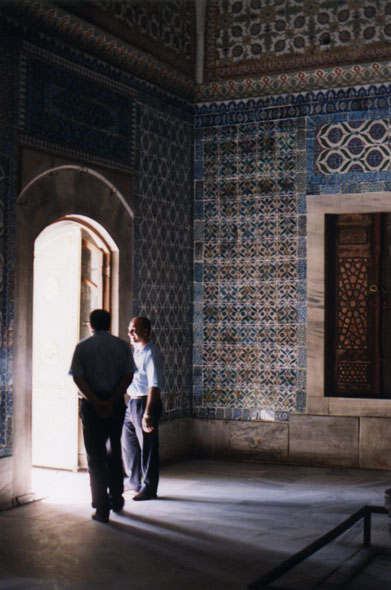
 the day before; as
massive as it was, Aya Sofya's scaffolding only disturbed one
particular section of the church. Here at Topkapi Sarayi
the day before; as
massive as it was, Aya Sofya's scaffolding only disturbed one
particular section of the church. Here at Topkapi Sarayi it felt like the entire palace was
a hard-hat zone. Having experienced the sublime beauty of palaces in
India, Thailand, Cambodia and elsewhere,
Susanne and I had expected Topkapi to be just as magnificent. We
were both rather disappointed.
it felt like the entire palace was
a hard-hat zone. Having experienced the sublime beauty of palaces in
India, Thailand, Cambodia and elsewhere,
Susanne and I had expected Topkapi to be just as magnificent. We
were both rather disappointed. 